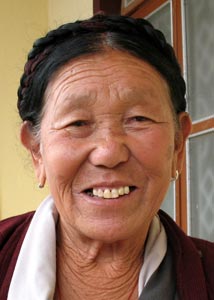Name: Pasang Dolkar
(Alias: No)
Gender: Female
Interview Age: 71
Date of Birth: 1936
Birthplace: Phari, Utsang, Tibet
Year Left Tibet: 1959
Profession: Business
Monk/Nun: No
Political Prisoner: No

Interview No.: 23
Date: 2007-06-28
Language: Tibetan
Location: Lugsung Samdupling Settlement, Bylakuppe, Karnataka, India
Categories: Culture and History
Keywords: childhood memories, Chinese -- oppression under, Chinese rule -- life under, death/burial customs, environment/wildlife, escape experiences, festivals, houses/villages, refugee in India -- life as, trade, Utsang
Summary:
"There is a saying that goes, 'In summer you may want to purchase Phari, while in winter you may want to sell it off,' " says Pasang Dolkar about her beloved birth place. She describes her beautiful town in summer and names the variety of flowers that covered the fields. Phari is also a cosmopolitan center where people traveled to trade goods from all over Tibet, as well as from Nepal, India, Bhutan and China. She tells of her childhood chores and describes her home.
Pasang Dolkar has fond memories of the annual horse-racing festival. She also explains the Tibetan practice of sky burial of the dead and the significance of this unusual ritual. She recounts the local myth of a romance between the mountain gods and the legend surrounding the story. She also describes the hot springs of Khambu, where people went to be cured of every kind of ailment.
When the Chinese came to Phari, they arrested the four wealthiest families. Pasang Dolkar's father-in-law worked for the Tibetan government so the Chinese army considered her husband's family to be "rebels" and was going to arrested them. She and her husband abruptly left their cherished homeland and all their possession in order to flee to Bhutan.
Interview Team:
- Marcella Adamski (Interviewer)
- Tenzin Yangchen (Interpreter)
- Jeff Lodas (Videographer)

